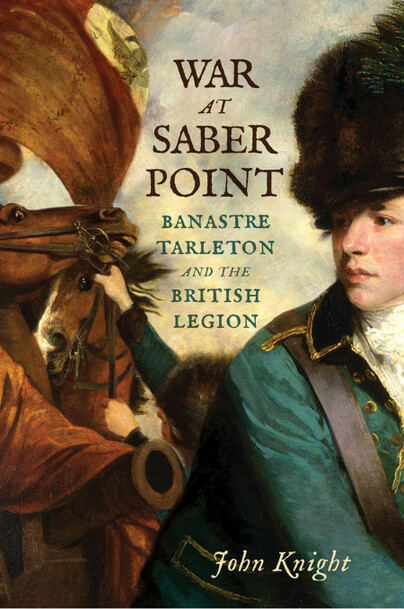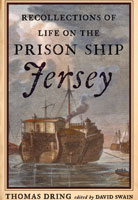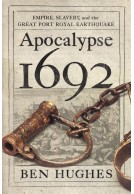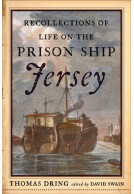War at Saber Point (Paperback)
Banastre Tarleton and the British Legion
(click here for international delivery rates)
Need a currency converter? Check XE.com for live rates
The British Legion was one of the most remarkable regiments, not only of the American Revolution, but of any war. A corps made up of American Loyalists, it saw its first action in New York and then engaged in almost every key battle in the Southern colonies. Led by a twenty-four-year old libertine who purchased his commission to escape enormous gambling debts, the Legion gained notoriety for its hard-hitting tactics. Excelling in “special operations,” they frequently overwhelmed the Continental forces they fought, becoming the most feared British regiment of the war.
Banastre Tarleton and the Americans he led have always been characterized as brutal, immoral villains—most recently in the movie, The Patriot. But this study subverts our pre-conceived notions of patriotism during the American Revolution. The men who filled the Legion’s ranks were not weak-willed collaborators or treacherous renegades, but free men as motivated by conscience as the Patriots they battled. Few were wealthy. None had a vested stake in the British Government. Each believed that in defending the Crown, they were upholding the rule of law and preserving individual liberty.
These men followed Banastre Tarleton clear across America for years, sacrificing not only their families and homes but, in many instances, their lives. Self-interest could not have persuaded them to do this. Patriotism and fidelity did. Relying on first-hand accounts—letters, diaries, and journals—War at Saber Point: Banastre Tarleton and the British Legion is the enthralling story of those forgotten Americans and the young Englishman who led them.
That the victors write the history has often, if not always, been the case; since the invention of cinematography, they can also produce feature films that reflect their propaganda. Readers of this magazine, who have probably watched many war films, will know what degree of historical accuracy is to be expected when Hollywood claims a drama is ‘based on’ factual events.
Arthur Harman, Miniature Wargames
The Patriot, a film ‘based upon’ the exploits of Francis ‘The Swamp Fox’ Marion in the American Revolution, starring Mel Gibson, is a prime example. As described in the Preface, in that film, ‘Colonel Tavington’ has civilians, men, women and children, shut inside a church, which is then set on fire – just like the Nazi massacre of French villagers at Oradour-sur-Glane in 1944 – but nothing like that ever occurred in the American Revolution!
The author discusses whether Banastre Tarleton ever committed the brutal acts for which he is infamous and seeks to do justice to “one of the most remarkable regiments not only of the American Revolution but of any war. A corps made up of American Loyalists, it engaged in almost every battle in the Southern colonies. The study of this legion subverts our preconceived notions of patriotism. The men who filled its ranks were not weak-willed collaborators or treacherous renegades, but citizen-soldiers every bit as motivated by conscience as the rebels they fought…The role such Loyalists played has historically been downplayed, and the American Revolution remains an account of oppressed colonists rising en masse to overthrow an oppressive British monarch.”
Twenty half-tone illustrations include reproductions of contemporary portraits of Major William Cathcart, the original commander of the British Legion, Tarleton, Major George Hanger and Earl Cornwallis; various prints and cartoons; two nineteenth century paintings of the Battle of Cowpens; and photographs of the colour of the 2nd Continental Light Dragoons, captured by Tarleton at Pound Ridge, and a Tarleton-pattern helmet of 1798.
There are three maps: a half-page reproduction of The Ambuscade of the Indians at Kingsbridge, August 31, 1778; a two-page map of the Southern Campaign 1780-1781, showing the Movements of Tarleton and the British Legion with numbered text boxes identifying the various engagements, which is a useful reference for creating a mini-campaign; and another two-page map of the Battle of Cowpens, SC, January 17, 1781, with arrows and numbered text boxes identifying the stages of the battle. Together with the detailed analysis of Tarleton’s errors in the text, it is perfect for wargamers wising to recreate that engagement as a tabletop battle. Although both of the two-page maps go right into the spine of the book, there is a degree of repetition on the facing pages so that no information is lost.
Thirty-seven pages of endnotes, a fifteen-page bibliography and a ten-page index conclude the book.
Banastre Tarleton was a very brave young man, a reckless gambler – unsuccessful on card tables but initially victorious on battlefields – and a serial seducer, whose early successes and meteoric promotion may have given him an exaggerated sense of his own military ability and led to his ultimate disaster at Cowpens. His relatively brief period of active service makes for most entertaining reading and may inspire wargamers to recreate his exploits.
About John Knight
JOHN KNIGHT earned a joint honors degree in American History and Politics from Warwick University. He was a fine-art appraiser for a number of London-based auction houses including Christie’s and Bonhams before taking up writing and lecturing full-time. A regular contributor to the Journal of the American Revolution, he splits his time between homes in Nottingham, England, and Dutchess County, New York.













